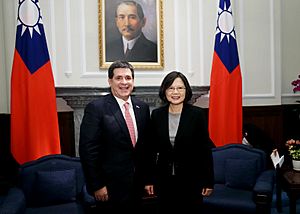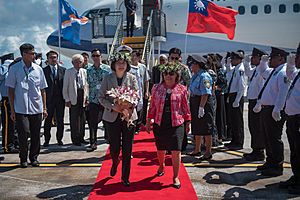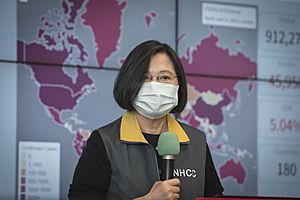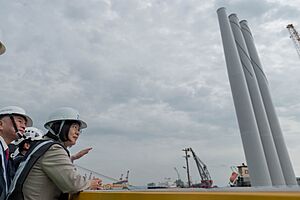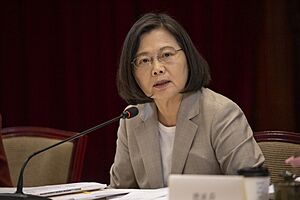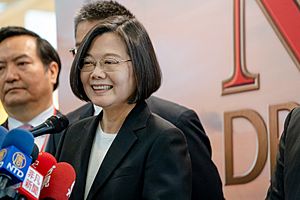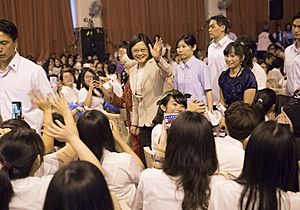Tsai Ing-wen facts for kids
Quick facts for kids
Tsai Ing-wen
|
|
|---|---|
|
蔡英文
|
|
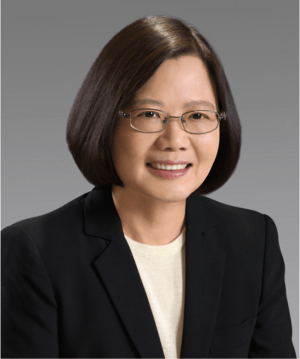
Official portrait, 2016
|
|
| 7th President of the Republic of China | |
| In office 20 May 2016 – 20 May 2024 |
|
| Premier |
See list
|
| Vice President | Chen Chien-jen Lai Ching-te |
| Preceded by | Ma Ying-jeou |
| Succeeded by | Lai Ching-te |
| 13th, 15th & 17th Chairwoman of the Democratic Progressive Party | |
| In office 20 May 2020 – 26 November 2022 |
|
| Secretary General | Lin Hsi-yao |
| Preceded by | Cho Jung-tai |
| Succeeded by | Chen Chi-mai (acting) |
| In office 28 May 2014 – 24 November 2018 |
|
| Secretary General | Joseph Wu Hung Yao-fu |
| Preceded by | Su Tseng-chang |
| Succeeded by | Lin Yu-chang (acting) |
| In office 20 May 2008 – 29 February 2012 |
|
| Secretary General |
See list
Wang Tuoh
Wu Nai-ren Su Jia-chyuan |
| Preceded by | Frank Hsieh (acting) |
| Succeeded by | Chen Chu (acting) |
| 26th Vice Premier of the Republic of China | |
| In office 25 January 2006 – 21 May 2007 |
|
| Premier | Su Tseng-chang |
| Preceded by | Wu Rong-i |
| Succeeded by | Chiou I-jen |
| Member of the Legislative Yuan | |
| In office 1 February 2005 – 24 January 2006 |
|
| Succeeded by | Wu Ming-ming |
| Constituency | Party-list (DPP) |
| 6th Minister of the Mainland Affairs Council | |
| In office 20 May 2000 – 20 May 2004 |
|
| Premier | Tang Fei Chang Chun-hsiung Yu Shyi-kun |
| Deputy | Chen Ming-tong |
| Preceded by | Su Chi |
| Succeeded by | Joseph Wu |
| Personal details | |
| Born | 31 August 1956 Zhongshan District, Taipei, Taiwan |
| Political party | Democratic Progressive (since 2004) |
| Education | National Taiwan University (LLB) Cornell University (LLM) London School of Economics (PhD) |
| Signature | |
| Scientific career | |
| Fields | Law and economics |
| Thesis | Unfair trade practices and safeguard actions (1983) |
| Doctoral advisor | Michael Elliott |
| Tsai Ing-wen | |||||||||||||||||||||||||||||||||||||||
|---|---|---|---|---|---|---|---|---|---|---|---|---|---|---|---|---|---|---|---|---|---|---|---|---|---|---|---|---|---|---|---|---|---|---|---|---|---|---|---|
"Tsai Ing-wen" in Chinese characters
|
|||||||||||||||||||||||||||||||||||||||
| Traditional Chinese | 蔡英文 | ||||||||||||||||||||||||||||||||||||||
| Simplified Chinese | 蔡英文 | ||||||||||||||||||||||||||||||||||||||
| Hanyu Pinyin | Cài Yīngwén | ||||||||||||||||||||||||||||||||||||||
|
|||||||||||||||||||||||||||||||||||||||
Tsai Ing-wen (Chinese: 蔡英文; pinyin: Cài Yīngwén; born 31 August 1956) is a Taiwanese politician and legal expert. She served as the seventh President of the Republic of China (Taiwan) from 2016 to 2024. She was the first woman to become president in Taiwan's history.
Tsai is a member of the Democratic Progressive Party (DPP). She was the leader of the DPP at different times between 2008 and 2022. She studied law at National Taiwan University and Cornell University. She also earned a PhD in law from the London School of Economics in 1984. Before becoming president, she held several important government positions.
Contents
- Early Life and Education
- Start in Politics
- Leading the DPP
- Presidential Campaigns
- Presidency (2016–2024)
- Political Views
- Personal Life
- Awards and Recognition
- Images for kids
- See also
Early Life and Education
Tsai Ing-wen was born in Taipei on August 31, 1956. She was the youngest of eleven children. Her father, Tsai Chieh-sheng, owned an auto repair shop. Her mother, Chang Chin-fong, was a housewife. Tsai's family background includes Hakka and Paiwan heritage.
She attended Taipei Municipal Zhongshan Girls High School. Following her father's advice, she chose to study law. She earned her law degree from National Taiwan University in 1978. Later, she received a Master of Laws from Cornell Law School in 1980. In 1984, she completed her PhD in law at the University of London. After her studies, she returned to Taiwan and taught law at Soochow University and National Chengchi University.
Start in Politics
Tsai Ing-wen began her government career in the 1990s. She worked as a consultant for important government bodies. These included the Mainland Affairs Council and the National Security Council. She also helped write laws about relations with Hong Kong and Macau.
In 2000, she was appointed as the head of the Mainland Affairs Council. This role deals with Taiwan's relationship with mainland China. In 2004, Tsai joined the Democratic Progressive Party (DPP). She was then elected as a legislator.
In 2006, Tsai became the Vice Premier of Taiwan. This is a high-ranking position in the government. She resigned from this role in 2007.
Leading the DPP
After the DPP lost the 2008 presidential election, Tsai was elected as the party's leader. She was the first woman to lead a major political party in Taiwan. She served as DPP chair from 2008 to 2012.
During her first term as DPP leader, Tsai focused on strengthening Taiwan's identity. She also worked to improve social justice. She often questioned the government's approach to relations with mainland China.
In 2010, Tsai debated President Ma Ying-jeou about a trade agreement with mainland China. She worried that the agreement would harm Taiwan's economy and independence. Under her leadership, the DPP gained more support in local elections.
Tsai resigned as DPP chair after losing the 2012 presidential election. However, she was re-elected as party leader in 2014. This happened after the Sunflower Student Movement, a protest against a trade deal with China.
In 2018, she resigned as DPP leader again after the party faced losses in local elections. She resumed the leadership in 2020 when she began her second presidential term. She stepped down from this role in 2022.
Presidential Campaigns
2012 Election
In 2011, Tsai Ing-wen announced her plan to run for president. She became the first female presidential candidate from a major party in Taiwan. She ran against the sitting president, Ma Ying-jeou, and James Soong.
The election was held on January 14, 2012. Tsai received 45.63% of the votes but lost to President Ma. After the election, she resigned as the DPP chairperson.
2016 Election
Tsai announced her second presidential campaign in February 2015. She was the only candidate in the DPP primary and was officially nominated in April. She visited the United States and met with important US leaders.
On January 16, 2016, Tsai won the presidential election by a large margin. She received 56.1% of the votes, defeating Eric Chu. She became the first woman to serve as Taiwan's president. She was sworn into office on May 20, 2016.
2020 Election
Tsai announced her bid for re-election in February 2019. She won the DPP primary against Lai Ching-te. Tsai and Lai Ching-te then ran together as the DPP's presidential ticket.
During her campaign, Tsai highlighted her government's reforms. She also emphasized national security and democratic values. Her strong stance against unification with China, especially during the 2019–2020 Hong Kong protests, gained her much public support.
Tsai won the election with a record 8.17 million votes, which was 57.1% of the popular vote. She was sworn in for her second term on May 20, 2020. Her presidency ended on May 20, 2024, and she was succeeded by Lai Ching-te.
Presidency (2016–2024)
During her time as president, Tsai Ing-wen focused on several key areas. These included economic growth, defense, and social reforms.
Defense and Local Industries
Tsai's government increased Taiwan's military spending. They aimed to make Taiwan more self-reliant in defense. This included developing local industries to build submarines and missiles.
For example, the AIDC T-5 Brave Eagle jet trainer, developed in Taiwan, had its first test flight in 2020. The first locally-made rapid mine-laying ship was delivered in 2020. Construction on an indigenous diesel submarine also began in 2020. In 2021, the navy launched its first locally-built amphibious transport dock, named Yu Shan.
In December 2022, Tsai announced that compulsory military service would be extended from four months to one year, starting in 2024.
International Relations
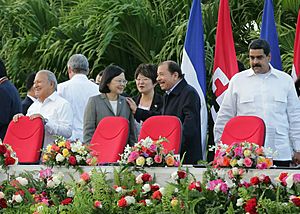
During Tsai's presidency, some countries that recognized Taiwan switched their recognition to mainland China. However, Taiwan also saw stronger unofficial ties with countries like the United States and the European Union.
In 2020, a high-level US official visited Taiwan, the first such visit since 1979. In 2021, the US ambassador to Palau also visited Taiwan. The European Union sent its first official delegation to Taiwan in November 2021. In August 2022, U.S. House Speaker Nancy Pelosi visited Taiwan, leading to military exercises by mainland China around Taiwan.
Cross-Strait Policy
Tsai's policy towards mainland China focused on maintaining peace and the "status quo." She acknowledged past talks but did not agree with the "1992 Consensus" as defined by Beijing. She believed that Taiwan's democratic will should be respected.
In 2019, she clearly rejected the "one country, two systems" model proposed by Beijing for Taiwan. She stated that Taiwan would not accept it. She also expressed support for the pro-democracy protests in Hong Kong.
COVID-19 Pandemic Response
Tsai's government managed Taiwan's response to the COVID-19 pandemic. They quickly increased mask production and later donated masks to other countries. Taiwan's early response to the pandemic was widely praised.
Economy and Trade
New Southbound Policy
Tsai launched the New Southbound Policy in 2016. This plan aimed to reduce Taiwan's economic reliance on mainland China. It focused on increasing cooperation with 18 countries in Southeast Asia, South Asia, Australia, and New Zealand. This cooperation covered trade, technology, agriculture, and tourism. The policy led to increased trade and investment with these countries.
Energy Policy
Tsai's administration aimed for Taiwan to get 20% of its electricity from renewables by 2025. They also worked to make the energy sector more open. Taiwan's first offshore wind farm, Formosa I, started operating in 2019. The government also invested in solar power.
While Tsai had campaigned to make Taiwan nuclear-free by 2025, a referendum in 2018 abolished this specific legal provision. However, her administration continued to phase out nuclear energy by not renewing licenses for older plants.
Infrastructure Development
In 2017, the Forward-Looking Infrastructure Bill was passed. This bill provided significant funds for various infrastructure projects. These included light-rail systems, water supply improvements, flood control, and green energy. The goal was to boost Taiwan's economy and improve public services.
Justice and Social Reforms
Transitional Justice
Tsai's government worked on "transitional justice." This meant addressing past injustices committed during Taiwan's authoritarian period. The Transitional Justice Commission was set up to investigate events like the February 28 Incident and the White Terror. They aimed to make historical records public and correct past wrongs.
Another important law dealt with "ill-gotten properties" of political parties. This law aimed to recover assets that were illegally transferred to political parties during the martial law era.
Judicial Reform
A new "Citizen Judges Act" was passed in 2020. This law introduced a system where regular citizens serve as judges alongside professional judges. This system began in 2023.
Same-Sex Marriage
Tsai Ing-wen supported LGBT rights and the legalization of same-sex marriage. In 2017, Taiwan's highest court ruled that not allowing same-sex marriage was unconstitutional.
Despite some opposition, Tsai's government worked to implement this ruling. In May 2019, a bill was passed that allowed same-sex couples to marry. This made Taiwan the first country in Asia to legalize marriage equality.
Labor and Pension Reforms
Tsai's administration made changes to labor laws. In 2017, new rules for a 40-hour work week were introduced. These rules aimed to give workers more rest days. However, these changes were later revised in 2018 to offer more flexibility.
The government also reformed the pension system. This was done to ensure that pension funds would remain stable for the future. The reforms affected civil servants, teachers, and military veterans. They aimed to make the system fairer and more sustainable.
National Languages
Tsai's government took steps to protect and promote Taiwan's diverse languages. Before her presidency, Mandarin was the only official national language. Her administration broadened this to include Taiwanese Hokkien, Hakka, 16 indigenous Formosan languages, Taiwanese Sign Language, and the Matsu dialect.
Laws were passed to support these languages. This included creating broadcast services and providing interpreters. The goal was to ensure these languages are preserved and used in public life.
Political Views
Relations with the United States
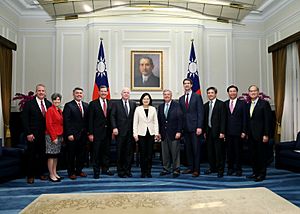
Tsai Ing-wen strongly supported a good relationship between Taiwan and the United States. In December 2016, she had a phone call with then-President-elect Donald Trump. This was a very unusual event, as it was the first time a Taiwanese president had spoken directly with a US president or president-elect since 1979.
She visited the US every year during her presidency, except during the COVID-19 pandemic. In 2021, she met with the US Ambassador to the UN via video link. In March 2023, she met with US House Speaker Kevin McCarthy in California. These meetings showed the strong unofficial ties between Taiwan and the US.
Domestic Policy Goals
Tsai supported various social groups, including the poor, women, children, and indigenous peoples. She aimed to reduce unemployment and expand public housing. She also favored government support for childcare.
She believed in government transparency and careful financial management. Tsai also called for less political division in Taiwan. She wanted a more open approach to solving problems and passing laws.
Personal Life
Tsai Ing-wen is unmarried and has no children. She is the first Taiwanese president to be unmarried. Her family background includes Hakka and Paiwan heritage. This makes her the first Taiwanese president with aboriginal roots.
Tsai is known for her love of cats. Her two cats, "Think Think" and "Ah Tsai," were often seen during her election campaigns. In 2016, she also adopted three retired guide dogs.
Awards and Recognition
Tsai Ing-wen has received international recognition for her leadership. Time magazine named her one of the "100 Most Influential People" in 2020. Forbes magazine ranked her among the "World's 100 Most Powerful Women" in 2021. She was praised for her handling of the COVID-19 pandemic and for standing up to pressure from mainland China.
She has also received honors from several countries:
 Belize: Order of Belize (2018)
Belize: Order of Belize (2018) El Salvador: Grand Cross with Gold Star of the National Order of Doctor José Matías Delgado (2017)
El Salvador: Grand Cross with Gold Star of the National Order of Doctor José Matías Delgado (2017) Eswatini: Collar of the Order of the Elephant (2018)
Eswatini: Collar of the Order of the Elephant (2018) Guatemala: Grand Collar of the Order of the Quetzal (2017), Grand Cross with Gold Star of the Order of the Five Volcanoes (2023)
Guatemala: Grand Collar of the Order of the Quetzal (2017), Grand Cross with Gold Star of the Order of the Five Volcanoes (2023) Haiti: Grand Cross of the National Order of Honour and Merit (2018)
Haiti: Grand Cross of the National Order of Honour and Merit (2018) Honduras: Grand Cross with Gold Star of the Order of Francisco Morazán (2016)
Honduras: Grand Cross with Gold Star of the Order of Francisco Morazán (2016) Paraguay: Grand Collar of the National Order of Merit (2016)
Paraguay: Grand Collar of the National Order of Merit (2016) Saint Kitts and Nevis: Order of St Christopher and Nevis (2019)
Saint Kitts and Nevis: Order of St Christopher and Nevis (2019)
Images for kids
See also
 In Spanish: Tsai Ing-wen para niños
In Spanish: Tsai Ing-wen para niños
 | James B. Knighten |
 | Azellia White |
 | Willa Brown |


